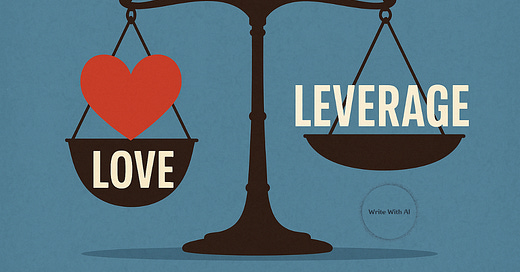In order to become a successful writer in the digital age, you have to stop romanticizing the work.
You’re either writing for yourself or you’re writing for the reader.
You have to pick.
And if you want to write for leverage and make money, you have to stop pretending you're above the game. Because you’re not writing for you anymore—you’re writing for the reader.
And that means:
Solving a real problem
Making it clear what’s in it for the reader
Structuring your writing around their transformation
Writing for yourself and writing for money are two completely different jobs.
Here’s why most “talented” writers stay broke:
They write beautifully, but they don’t write for anyone.
And they believe talent is supposed to be enough.
It’s not.
So if you're sitting there with this image in your mind of what you think being a writer is all about: taking long walks in the countryside, lounging around all day, bleeding on the page, wrenching your soul into the writing and never worrying about your bills, I’ve got news for you. This couldn’t be farther from the truth.
Even Hemingway worried about paying his rent!
Being “romantic” about writing isn’t actually you being true to the craft.
What you've done is found a clever way to:
Rationalize not working very hard
Rationalize not being brutally honest with yourself
Rationalize not learning the business side of your art
Rationalize not having clarity about when to write for love and when to write for money
All of these things are painful to admit.
But once you see behind the curtain, it’s obvious:
Publishing isn’t about art.
It’s about business.
Early in my career, I told myself the same story most writers do: “I just want to write what I love.” And then two seconds later, I’d complain,“It’s so hard to make a living as a writer.”
And every time I tried to mix the two—
I either wrote something no one wanted to read…
Or I wrote something I didn’t even want to finish.
But once I separated those two roles, everything changed—and my income multiplied.
Your income as a writer is less about your brilliance and more about how many people want what you’re making.
For example, if you write Romance fiction you're probably going to be more financially successful than the person who writes literary fiction.
It has nothing to do with your talent and everything to do with the size of the total addressable Market of readers. You might not like it, but it’s how it works.
Most writers have no idea how the business of writing works.
But the ones who do? They’re the ones who make the most money.
Because:
They build audiences. Which gives them a massive edge when it comes time to sell.
They learn to sell. Because they understand how to position what they write, they sell more copies—plain and simple.
They write A LOT. Volume is what sharpens their skills, helps them learn faster, and make more money because of it.
The real bottleneck to you becoming a successful writer and achieving anything on your list of meaningful Milestones is to stop romanticizing what you think it's like to write in the digital age.
Broke writers spend their entire lives in this cognitive dissonance between these two opposing statements:
“I want to write what I want to write about and I want to make money.”
And I'm here to tell you that until you come to terms with that cognitive dissonance you are going to stay stuck forever in the information age.
So if you want to write for love—amazing. Do it.
But if you want to write for leverage?
Start by making one clear decision before you sit down to write:
Is this for me?
Or is this for the reader?
Most ideas can serve either purpose. But they can’t serve both at the same time. So get clear before you start.
Here’s a simple AI prompt to help:
The Love Vs. Leverage Prompt
When you’ve got an idea you want to write about, ask AI this:
I want to write about [YOUR IDEA].
Give me 5 ways to write it for personal satisfaction / reflection (write for love).
And give me 5 ways to position it to solve a specific reader’s problem (write for leverage).
This helps you zoom out and see the difference between writing for love vs writing for leverage.
For example:
Let’s say you want to write about burnout.
You plug the idea into the prompt and run it through ChatGPT or Claude.
The AI gives you 10 angles—5 personal, 5 reader-focused.
This does two things immediately:
It shows you the split. You can clearly see what it looks like to write for yourself vs for your audience.
It multiplies your options. You walk away with 5 angles to explore for each intention—creative expression or reader impact.
There’s no right answer.
But the key is to recognize the difference before you start writing—so you don’t end up with a piece that serves neither purpose well.
That’s it.
Chat soon,
—Dickie & Cole
Co-Founders of Ship 30 For 30
Co-Founders of Premium Ghostwriting Academy
Co-Founders of Typeshare
Co-Founders of Write With AI
What did you think of today’s newsletter?
❤️ Loved it. Refer it to a friend or drop a 🙌 below.
🫤 Meh. You can unsubscribe here. Or manage your subscription here.
🥳 I’m new here. Welcome! Grab these 3 resources to get started writing with AI.
🤩 Give me more. Check out reader favorites here (and all our free & paid products here).







I think the best posts are emotional enough to care, and useful enough to share.
Thanks for breaking it down so simply.